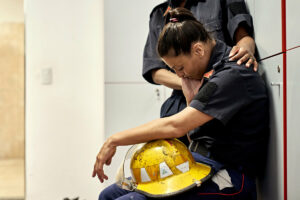Research shows that between 30-35% of 911 dispatchers, police officers, EMT’s and firefighters have been diagnosed with PTSD, which can range from being temporarily distressing to permanently disabling. Additionally, nearly 70% of first responders have been affected by ERES (Emergency Responder Exhaustion Syndrome), which is not triggered by any one event, but is a build-up of daily, chronic, and cumulative negative emotions that get “stuffed down” each day. In other words, nearly 100% of first responders can expect to be negatively affected in some significant way, at some point in time, by their work. It simply comes with the territory.
Adverse effects of PTSI as well as ERES may include psychological problems, impaired job performance, marital/family problems (including domestic violence), diminished physical health, and substance abuse. It is a well-documented fact that First Responders are especially prone to: depression, alcoholism, divorce, anxiety disorders, burnout, as well as at increased risk of suicide. Additionally, adverse effects of chronic stress will not only affect you, but also your spouse or life partner, extended family, and children.
By nature of what you do, first responders are amongst the most resilient people on earth. And yet, everyone has their breaking point. Everyone has “those cases” that get behind all your defenses and end up taking up space in your head. It’s part of the human condition. First responder agencies such as law enforcement, fire departments, 911 communication centers, and emergency medical response, as well as the U.S. military, are all beginning to pay attention to the high cost of line of duty trauma and cumulative stress. Resiliency and Self Care classes and Peer Support programs are popping up all over the country. Seeking therapy is also becoming normalized; I believe that together we can end the stigma against seeking help in Emergency Responders.
Healthier Emergency Responders equal healthier communities. Together, we can be the change we want to see in the world.





